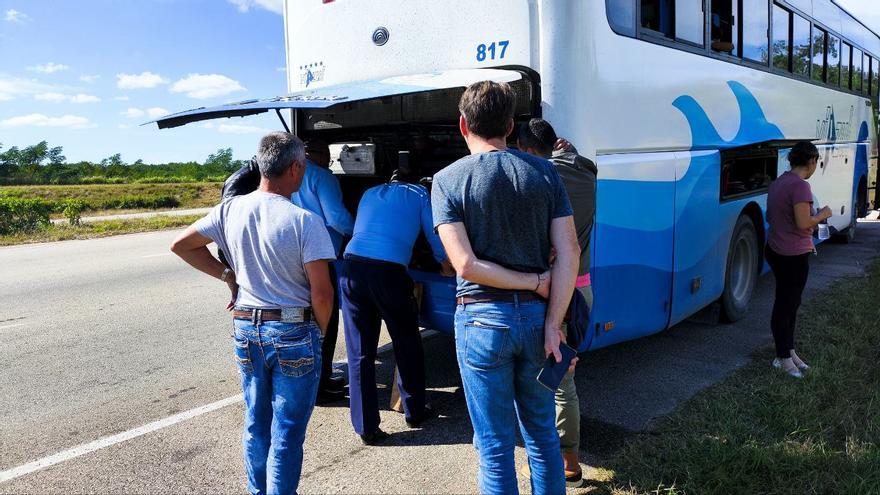
![]() 14ymedio, Olea Gallardo, Havana, 4 January 2024 — The trip from Ciego de Ávila to Havana by bus is neither short nor cheap, but Maidelys is already used to it. This habanera has been traveling that road by public transport for ten years every time she has a vacation, to visit a sister in the central province. Although the distance is about 400 kilometers, or 250 miles, the trip between the two cities by road takes almost eight hours. That is, if there are no unforeseen events like those that happened this Wednesday, which caused her to arrive three hours later.
14ymedio, Olea Gallardo, Havana, 4 January 2024 — The trip from Ciego de Ávila to Havana by bus is neither short nor cheap, but Maidelys is already used to it. This habanera has been traveling that road by public transport for ten years every time she has a vacation, to visit a sister in the central province. Although the distance is about 400 kilometers, or 250 miles, the trip between the two cities by road takes almost eight hours. That is, if there are no unforeseen events like those that happened this Wednesday, which caused her to arrive three hours later.
As has been customary for a long time, another brother, an emigrant, had given her the ticket, which cost 28 euros, buying it on the Viazul website, where payment is only accepted with foreign cards. Very few can afford these prices, so the vehicle, coming from Santiago de Cuba, was full of foreign tourists, many of them Cuban-Americans, with very few domestic travelers.
The bus left at six in the morning from Ciego de Ávila, and Maidelys fell asleep right away, until they reached the next stop, Sancti Spíritus. “Fortunately it was one of the comfortable buses, because in some Astros [National Bus Company] I can’t get a wink of sleep,” she says. “Once I traveled in one that had no floor in front of my seat, and I spent the whole trip thinking that if I fell asleep I would fall through the hole.”
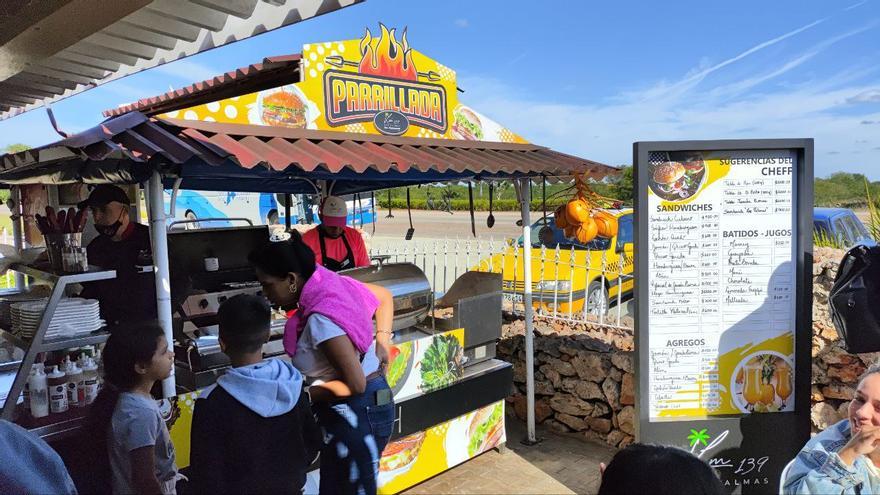
Another advantage of going in a “tourist” vehicle is that they have hot food at the stops. “With the bus of the proletariat, there’s only sugar and more sugar,” Maidelys jokes, referring to the soft drinks and cookies sold at the government stops.
At kilometer 139 of the National Highway, after passing Santa Clara, the bus stopped for breakfast. “There’s a goldmine here,” is how Maidelys described the atmosphere of the Las Palmas restaurant, a “grill” where the meat dishes cost 2,000 pesos, the sandwiches go from 600 to 1,200, and a malted milkshake costs 500. They also sold boxes of cigars for 120 dollars, although some foreigners haggled until they got them down to 110.
Everything seemed to be in order – they had already passed through the provinces of Cienfuegos and Matanzas – when with just under an hour and a half left to reach the capital, at kilometer 72 on the highway, at the height of Nueva Paz in Mayabeque, the vehicle stopped.
“At first you only heard the driver and someone else, like a baggage handler, and no one worried,” says Maidelys. “But then the air conditioning turned off, and people began to protest, saying it was a lack of respect, what with the cost of the ticket.”
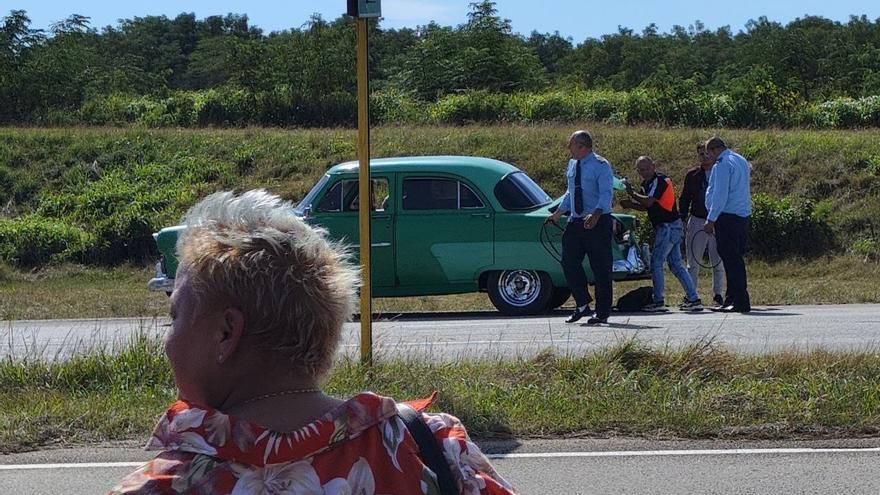
After half an hour, the driver gave his diagnosis: the transmission belt broke and, worst of all, he did not have a spare. He did not say if they would have to wait for another vehicle or if the company would send help. “There is a review department that is supposed to handle all breakdowns,” Maidelys says. “It shouldn’t happen because they’re charging you up the nose, and none of these buses have the comfort they’re supposed to have.”
The driver himself, she says, acknowledged his impotence before the travelers who complained about the breakdown: “He told us that the rule said that after five years the buses should be renewed, but that Viazul has not had new buses for at least 15 years.” The laughter of those present testified to the lack of credibility of the driver’s excuse for such precariousness: “the blockade.”
Soon, as the minutes passed and there was no solution, the good mood gave way to restlessness. “There were people with flights at two in the afternoon, another with a ticket for 1:00 pm, but he already knew it was lost,” says Maidalys. The most dramatic case was that of a young mother who was traveling with her daughter to get to Nicaragua — from where she would probably make the journey to the United States: she cried when she saw her money for the bus tickets wasted.
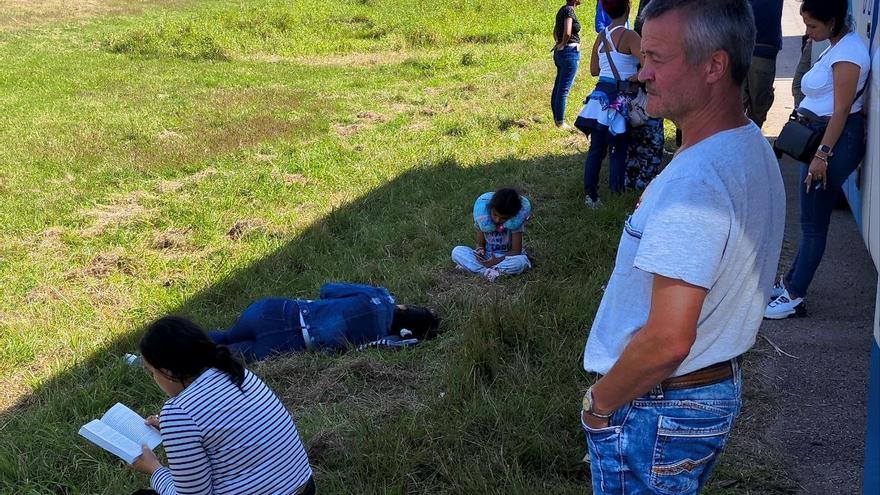
Those who did not have to catch a plane were the most resigned, and they spread out on the ground, like Maidalys. From a mound she saw how the bus driver desperately stopped other vehicles to ask for help. “An almendrón [a 1950s American car operating as a shared taxi] stopped, but they didn’t have the right part, and then a Transgaviota bus, which didn’t have spare parts either,” she says.
And she continues with the surreal parade that soon populated the place: “A pastry seller appeared and then someone who sold preserves, to get us to buy a kilo, but the worst thing was that an old woman who got on in Santa Clara began to hyperventilate. I don’t know if it was from anxiety or fatigue, but they said that there was no ambulance to pick her up.”
It was more than an hour after being stranded that they began to call the passengers whose final destination was terminal 3 of the José Martí International Airport, to get them into another vehicle. “But they were warned that they had to stand up,” Maidelys says. With that bus, a fan belt also arrived, but it didn’t solve the problem either.
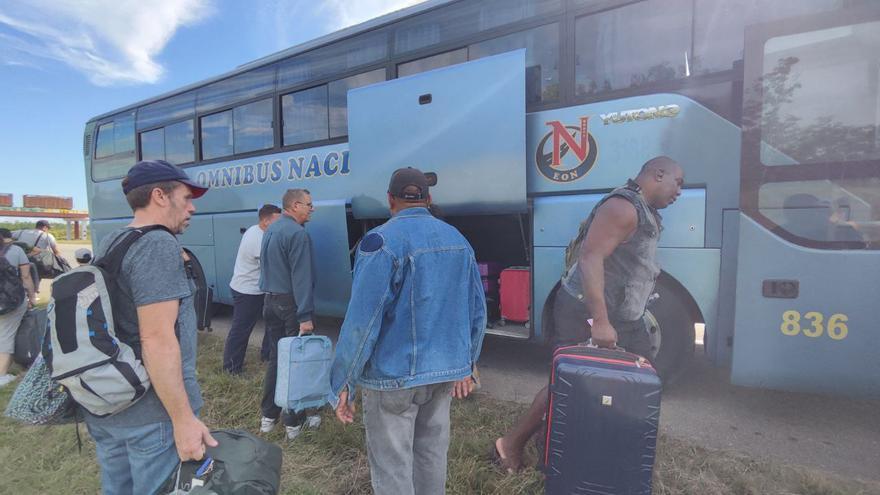
“We had to wait almost three hours for another bus to come and pick us all up,” says Maidelys, who finally arrived at her destination, the bus terminal near the Plaza de la Revolución, at the end of the evening. “I had a piece of meat in my suitcase. It was frozen but I was already afraid that when I arrived in Havana it would be cooked. Rather than Viazul, they should call it Viacrucis [the Way of the Cross].”
The only happy person during the trip, she indicates, was a passenger who, in the middle of the journey, learned that she had received Spanish citizenship: “She started screaming like crazy, and it’s no wonder. She’s not going to have to put up with the things of this country anymore.”
Translated by Regina Anavy
____________
COLLABORATE WITH OUR WORK: The 14ymedio team is committed to practicing serious journalism that reflects Cuba’s reality in all its depth. Thank you for joining us on this long journey. We invite you to continue supporting us by becoming a member of 14ymedio now. Together we can continue transforming journalism in Cuba.
